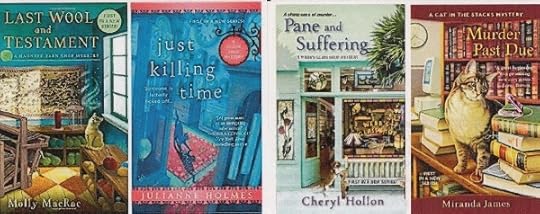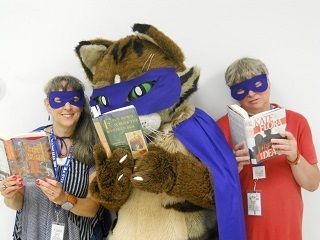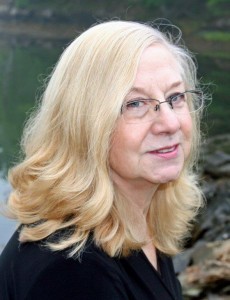Kathy Lynn Emerson's Blog, page 74
May 26, 2016
Freelance Editing for Fun and/or Profit
Jen Blood here on a gorgeous May day, taking a break from the daily grind to write this. As a freelance editor, I get asked fairly frequently how I got started, and how I recommend others get their footing if they think editing is the career for them. Usually when I get that question, I grimace internally, consider the fifteen years I was virtually penniless while I learned what it actually meant to be a freelance editor, and file the email away somewhere to answer later. And then, inevitably, I forget about it.
Today, after getting another email from a would-be editor trying to figure out how to get her foot in the door, I decided I would actually try to provide a real answer.
First, though, a little about what I do.
In addition to being a writer myself, I work as a freelance copy and content editor for traditional and independently published authors, and also offer beta reading services and some marketing and publishing consultation for self-published authors. I’m paid by individual writers rather than companies, and I offer my services through my own business (Adian Editing). My focus is on plot-driven fiction because that’s what I’m most well-versed in and most passionate about, but I’ll occasionally do nonfiction if it’s a topic that grabs me or an author I’ve worked with in the past on other projects. My specialties include mystery, thriller, romantic suspense, fantasy, YA (young adult), and occasionally romance, erotica, or science fiction. Last week, I did a content edit on a spy thriller, a copy edit on a supernatural mystery, and beta read a contemporary romance. This week, I’m content editing an action/romance and copy editing a horror/zombie apocalypse thriller. Next week, I’ll be copy editing a YA dystopian thriller, beta reading an erotic short story, and content editing a YA fantasy.
So, those are my days. I work anywhere from 9 a.m. until midnight, to 9 a.m. till noon, depending on deadlines and what’s on my roster. At this point, I don’t generally need to worry about drumming up business — I’ve been doing this long enough and word of mouth is happily good enough, that I can pick and choose my clients and am typically booked for at least the next six to eight weeks. I could book farther out, but for my own sanity try to keep it limited to the next two months. I have a stellar client list of hardworking authors I love and respect, and we generally have a great back-and-forth when it comes to the writing craft, the growth and development of their characters, and what their next steps are in order to achieve their writing and publishing goals. I don’t have an assistant (though I should probably get one at this point), but I do occasionally hire subcontractors to do proofreading for me once the actual editing is done, just to have another pair of eyes on a project.
I still ultimately aspire to work full-time as a novelist, but this is a pretty great way to pay the bills in the meantime. I’ve been able to hone my own craft on the job, and I love the fact that I can choose work that I’m genuinely excited about, by writers who are serious about both the craft and the business of being authors.
So, that’s me. Now let’s get to you. How do you become an editor — working from home, making your own hours, helping authors get better at a craft you both love?
As I mentioned before, it took me fifteen years to get here. It was long and circuitous and not terribly profitable during that time, but I’ll be the first to admit that my methods were hardly the most efficient. Here’s what I recommend instead.
If you’re truly just getting started, and have no college degree (or no college degree related to the field in which you hope to work), consider taking a certificate course online through a reputable college or organization. I took one in 2014 that was actually quite helpful, though for the life of me I can’t remember what the website was. I will say up front, however, that having undergraduate and graduate degrees in Creative Writing has made a big difference in the amount I’m able to charge and the way clients receive my feedback — not to mention the fact that so many of the skills I use on the job were honed in school.
Volunteer or get an internship. You don’t have to be nineteen to work for free — regardless of your station in life, if you have no practical experience as an editor, check in with your local newspaper or contact a professional editor, to find out if they have any openings for interns hoping to learn the business.
Hone your communication and customer service skills. Freelance editing, particularly the kind where you’re working directly with the author, is not just about understanding what makes a novel work. It’s about being able to communicate that clearly to your client in a way that conveys what needs to be changed without making them quit writing and go jump off a cliff. Writers are sensitive sorts, so this isn’t as easy as you might think. I use a lot of humor, am liberal with my praise for anything that even remotely works in a manuscript, and then I pull no punches. Because, ultimately, you’re getting paid to be a critic, not a Mom.
If you already have a college degree in English or Writing or some related field, and you have hands-on, demonstrable experience as an editor, here’s what I recommend.
(1) Specialize.
As an undergrad, I printed brochures offering my services as an editor. And a copywriter. And a graphic designer. And an office cleaner. And your BFF who’ll pick up coffee and write nice cards to you when you’re feeling blue. Okay, the last one wasn’t on there, but it was definitely implied. I went to a copywriter with an advertising firm in Portland and gave him the brochure. His response? “I don’t know what you do.” I pointed at the brochure. “I do anything — whatever you need.”
Wrong answer. If you’re doing everything, you’re not doing anything all that well. Figure out what you love and what you’re good at (hopefully, these are not mutually exclusive), and focus on that. If you love nonfiction, trust me — there are writers out there desperate for a good editor. Memoir, children’s books, science fiction, Christian fiction, mysteries penned by cats… Right now, you can’t swing one of those mystery-writing cats — dead or alive — without hitting an author or would-be author. They all need a good editor. Don’t be afraid to hone in on that.
(2) Charge the Going Rate…and then some.
I started out offering my editing at rock-bottom prices because there were so many other editors out there offering their services at rock-bottom prices. The thing is, a lot of those editors had no experience and were terrible at their jobs — in fact, a fair number of the work I get now is re-editing the books they edited poorly the first time around. I did some market research, honestly evaluated how much time it took me to edit a manuscript from beginning to end, and considered how much I wanted to earn, and then I increased my prices. A lot. People pay for quality; if they see rock-bottom prices, they assume you can’t charge more because you’re not worth more. Charge what you’re worth, and stand by that.
(3) Know Where to Go for Work.
I got a lucky break just when my business was starting to really take off, when Joanna Penn — author of the award-winning blog and podcast The Creative Penn — was looking for a new editor and asked if I would do a sample edit. I already knew Joanna from a couple of interviews I’d done with her for my own blog and a guest post I’d written for hers, so the request didn’t come out of the blue. Still, I jumped at the chance, and it paid off. If you know authors who have a good following, ask them if they need an editor. If you’re reading a book by an author you think could be edited better, write to them. Nicely.
Dear Jane Doe, I love your writing style and your mysteries invariably keep me up all night. I noticed on the last couple of books you’ve written, however, that there were some editing errors that detracted a bit from your narrative. I hope you don’t find it too forward of me, but if you would like a complimentary edit of your first chapter to get an idea of my expertise, I’d love the opportunity to work with you.
Be polite, but confident. Don’t talk about how you’re just getting started and are hoping to get a break in this cruel world — sometimes that works, but too often it comes off as groveling.
(4) Be professional.
Have a website. Make sure the writing is clear and concise, and there are no misspellings or grammatical errors. Have a contract. It doesn’t have to be lengthy, but it should cover the bases and clearly define things like price, deadlines, and what you’re promising the client. I also have a standard questionnaire I send out to prospective clients, which gives me an opportunity to learn a little more about who they are and what they’re hoping to achieve with their writing. Be courteous when responding to email inquiries, even if the person is writing from the Seventh Circle of Hell and wants you to edit a memoir about his tormented inner child – for free.
I know a lot of these seem like no-brainers, but it never hurts to mention them. And finally…
(5) Hone Your Craft.
Editing is hard work. It takes concentration, long hours, and an inherent understanding of how quality writing works. Read — a lot. Study great novels. Study terrible novels. Check out websites like Grammar Girl and Grammarly to get the skinny on the latest editorial debates. Network with writers and other editors. Take classes when they’re available. Teach classes when you have the opportunity. Become an expert.
So… That’s my advice for folks out there who’ve been dreaming of making a change and living a life devoted to the written word. I hope this is helpful. Best of luck!
Jen Blood is author of the bestselling Erin Solomon Mysteries, and owner of Adian Editing, providing expert editing of plot-driven fiction for independent and traditionally published authors around the world. For your free Editing A to Z Cheat Sheet, visit http://adianediting.com/.
May 25, 2016
The Part of Writing I have The Most Trouble With

My Book Box
My most recent novel, THE BLACK ORCHID, was released in mid-March and received a favorable review from Publisher’s Weekly: : “…Hardacker keeps the action flowing all the way to the violent climax.” I was also pleased to learn that My Book Box had selected it to be included in their April box (if you aren’t familiar with them check out: http://www.mybookbox.com). They are an up-and-coming book club. Each month they send a book box containing 2 books are included (one from each of the subscriber’s selected genres). Most often the children’s books will be hardcover and adult books will be paperback. They are always new releases in the U.S. within the past 45 days. Do not expect to receive the latest New York Times Bestseller, but do expect an amazing read from a talented author. Each box will also include something special, usually some sort of token such as a book mark or even just a letter from one or both authors, and when available, exclusive content for the included book!
So, you’re probably asking “What’s to hate?” For me the answer is easy PROMOTION!!! I have never been an out-going person (as a matter of fact I kind of envied the North Pond Hermit–not the fact that he was a prolific burglar but the way he avoided encountering a member of the human race for twenty-seven years). My late wife was cut from the same mold. When we lived in New Hampshire a major winter storm hit the Nashua area where we lived. She and I nestled into our warm home and didn’t come out for three days (we only popped out then because a concerned neighbor knocked on our door to see if we were still alive…) completely content to ignore Mother Nature and her cruel sense of humor. However, I must clarify this somewhat: I am not afraid to do public appearances; in fact the opposite is true. I gladly agree to appear at any author event that is offered… There is the key the phrase: that is offered…
What I have a difficult time with is finding the venues. Living up here in the county doesn’t help either. The closest book store of any size is in Bangor, a three and a half hour drive) and attendance at the appearances I’ve done at local libraries has usually been two: me and the librarian. I have come to finally realize that people go to libraries to borrow books; not to buy books! There was one pleasant surprise however, last September I appeared at the Curtis Memorial Library in Brunswick and spoke to an audience of more than fifty readers. Even more surprising was that from their questions, it was evident that many of them had read my books!
The most success I’ve had in booking appearances (and I don’t mind traveling anywhere in the northeast) has come from our own Kate Flora. Kate knows me for the introvert I am and when we attended the 2015 Maine Literary Awards last year took me by the hand and introduced me to several other people there. She has also aided me in getting a number of appearances–the Curtis Library among them (terrific venue! Over fifty people in attendance and it was a great evening.
When THE BLACK ORCHID was released I made up my mind that I was going to aggressively promote the book and determined to construct a campaign that included a number of steps:
I setup a Goodreads giveaway of five autographed copies of the book 1204 readers have requested it; another 643 readers added it to their “to Read” list. A word off caution here: If you have not done a Goodreads Giveaway and elect to do so, Be careful how you set it up. They offer a number of options one of which is what country(ies) would you like to run it. I wanted to do it in the US only (you are responsible for mailing the books to the winners) but hit the wrong selection and included Canada and the UK. Three of my five winners were from outside the US–two from Canada and one from Great Britain–the postage came to $60.00! Still cheap if you figure that if 1204 people registered to win that comes out to about five cents per registration, pretty cheap exposure. Still it was a bit of a shock when I saw the postal charges. Thank god all five weren’t in Great Britain. FYI, outside the US there is no media mail and you have to pay regular mail rates in my case $22.50 to Great Britain and $15.50 to both Nova Scotia and Ontario.
I have emailed each of the major bookstores serving Maine and many of the indies. I have yet to hear from Books-a-Million or Barnes and Nobles. I was contacted by Sherman books who informed me that they were in the middle of inventory and for me to please get back to her in June. I am finding that BAM and B&N are pretty much an exercise in futility (if any of you has had success in booking an appearance at one or the other, please get in touch with me and tell me the secret).
I have booked several local venues to wit: commencing on June 2 Caribou will be starting their bi-weekly Thursdays on Sweden event (I blogged about it last summer) and on Wednesdays they will be having a weekly Farmer/Craft Market (No admission fee for either of these events. You do have to register for ToS–I have a table reserved for each Thursday so if you’re up this way touch bases with me I’ll gladly slide over and let you have a seat at my table (FYI last summer I sold over $500.00 of my books–I was one of three vendors selling books.)
The above schedule still leaves a lot of gaps on my calendar… If you should find yourself in need of someone to appear either with or for you, contact me. I decided to print up some business cards…they will read: HAVE BOOKS: WILL TRAVEL…
May 24, 2016
I Didn’t Know I Was Allowed . . .
Kate Flora: Last week my husband and I were sitting with some good old friends in
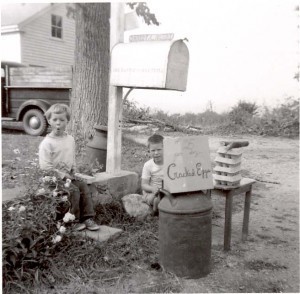
I knew things weren’t what they were cracked up to be at a very young age.
Oxford, England, talking about the length of our friendship, and what we were doing now, the usual catching up people do. I had brought them a copy of And Grant You Peace and our hostess asked me if I’d always wanted to be a writer.
It’s a pretty common question to ask an author. It comes up all the time during book talks at libraries and bookstores. I think my usual answer probably is something along the lines of “all my life” and then I move on. But the question made me reflect on what the real answer was. I was always enchanted by books and what authors can do. Certainly, like many another, I was writing from a very young age. Middle school was a particularly fertile time, when my friend Pammie and I wrote plays and epic poems. In high school and after, I wrote a joint novel with my oldest friend Karin, the two of us sending chapters back and forth. Later, I did the same thing with a housemate from college.
But despite all that, and despite the fact that my mother was a writer, the answer I gave to my hostess’s question, one that surprised me, perhaps, as much as it did her, was that when I was growing up, I didn’t actually believe I was allowed to become a writer. To write, perhaps, but not to be allowed to call myself a writer. I might have dreamed about it. I might have longed to have that special, magic talent that would let me take people into a world I’d imagined and hold them there, but it seemed beyond the scope of the life I was living on a farm in rural Maine to imagine that I would actually be allowed to call myself a writer. It seemed too proud. Arrogant, even. And I truly believed that writers were people with a special gift, anointed somehow to engage in their chosen craft, while I was just a dreamy farmer’s daughter.
One of the things that made it seem more like an impossible dream than a reality was that
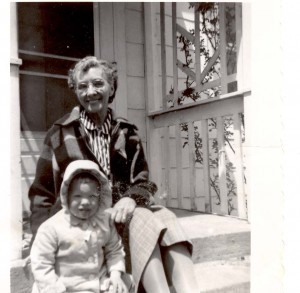
A famous Maine author with her paternal grandmother
I knew I would have to make a living. My childhood was a constant series of financial crises. Agriculture of any sort is a fickle business, and as the price of eggs rose and fell, it seemed we were always in danger of losing the farm. My siblings and I would huddle in a dark, safe place at the top of the cellar stairs when the bill collectors came to the door. Being safe from a life like that meant going to college and choosing a career that would give me a more reliable income.
I dutifully went to college. Then, after discovering that my degree in English, which I had believed was the magic ticket to a career, qualified me for little, I went to law school. During those years of school and starting to practice law, I was too busy to do much more than dream about writing, or dip my toe in in the form of the occasional writing class. But in one of those occasional writing classes, one that either met in a damp church basement in Wellesley, Massachusetts, or at night in a classroom at Brandeis, I was anointed. It came in the form of an offhand comment from the instructor, Arthur Edelstein, along the lines of “Don’t let them tell you otherwise. You ARE a writer.”
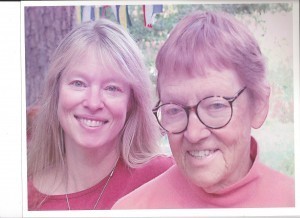
Me and my mom
It was several more years before I was able to wrap the mantle of that permission around me and sit down to give writing a serious try. For some of us, it seems, we have to reach a point where the passion for trying outweighs the fear of failing. And so, when my second son was born, I thought I’ve always wanted to write, and maybe it is something I can do around the busy lives of two small boys. They never slept. They were never still, and yet somehow, a year later, I typed “The End” at the bottom of my first novel. It went into a drawer and was followed by two more, and ten long years in the unpublished writer’s corner, before I published my first book. Claiming to be a writer still cowed me so much that I think I had sold my fifth book before I started putting “Writer” in the line that asked for occupation.
And in gratitude to the great man who took the time to anoint me, I now tell my students two important things. First, that if you want to be a published writer, you’ll need the hide of an alligator, because our world is full of rejection. But second, and more important, although most of the world will try to convince you that you’re not, rejection will outweigh praise, and you have to be your own cheerleader, you are allowed. Only YOU get to decide that you’re a writer.
May 23, 2016
Going to the Source of Inspiration
In Cover Story, the second book in the Joe Gale series, my newspaper reporter protagonist finds himself on deadline without a computer. Does Joe panic? Nope. He goes to the local library.
He’s covering a high-profile murder trial in Machias during the brutal winter of 2015. His laptop is stolen when he’s on deadline in an apparent attempt to stop him from writing about unexpected testimony and contradictory evidence. Nothing if not resourceful, Joe responds by walking across Court Street to Porter Memorial Library where a helpful librarian and public access computers save the day.

Beautiful, historic Porter Memorial Library in Machias
When a writer features an actual library in one of her books, it goes without saying she must do a reading there. That’s why I was tweeting and facebooking from Porter Memorial Library a couple of weeks ago, the little gem of a library that played a small but critical role in Cover Story.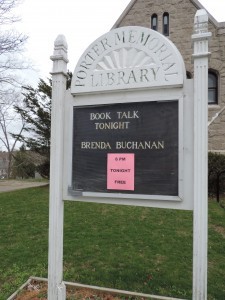
Here’s one of the passages about Joe Gale’s use of the library:
Earlier in the week I’d noticed the Porter Memorial Library—a handsome granite structure that looked almost like a small church—across from the front door of the courthouse. As luck would have it, the librarian was not the sort to close the library’s doors at the sight of a few flakes of snow. Five feet tall with gray hair hanging loose to her waist, she peered at me through granny glasses when I asked about internet access. She said the library had Wi-Fi so I could work from any seat in the house. I found a quiet corner, reviewed my notes and began to write.
Ninety minutes later I scrolled through my story, frustrated by the undeniable fact that it didn’t sing. In fact, it didn’t even hum. I hadn’t eaten lunch yet, and my mind kept shooting back to the events of the previous night. The result was an awkward lead and a disjointed narrative. I went to the john, washed my face, returned to my seat and tried again.
**
My Machias reading originally was scheduled for mid-December but an unexpected snowstorm caused the event to be rescheduled for May 4, when spring was beginning to make itself known Downeast.
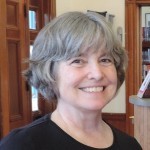
Library Director Lee Downing
I was delighted beyond words to read at Porter Memorial, where director Lee Downing and an enthusiastic bunch of readers welcomed me. I’d visited incognito when I was writing Cover Story to make sure I had the feel of the space. At the time, I wasn’t imagining a future reading there. But once the book was published, arranging a visit to Porter Memorial Library was high on my must-do list.
I explained to the folks who attended my reading that Cover Story actually is the first book I actually wrote−though not the first to be published−and for that reason it will forever hold a special place in my heart, as will Machias, its courthouse and its library.
Cover Story is a book about a trial, minus the boring stuff that happens in real life trials and featuring several harrowing scenes that were easy to imagine happening in the tundral landscape of Downeast Maine in January.
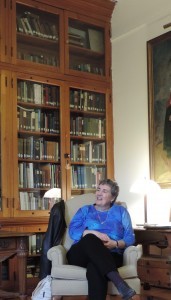
They gave me the best seat in the house
When writing the book I worried about getting Washington County wrong. I’d lived in neighboring Hancock County but never all the way Downeast, which is very much its own place. I know the geography well enough (and I have a trusty DeLorme) but writing about a distinctive community requires an understanding of the people who live there and respect for regional culture.
I made a couple of trips to Machias during the writing process−an especially memorable one on a cold weekend in February−to remind myself about the cadence of life in Washington County and the intensity of the wind howling across the blueberry barrens. I hope I did that wild and beautiful county justice.
MCW emerita Sarah Graves−who lives and writes in Eastport−reassured me with a generous blurb about Cover Story [3] and nobody showed up at the May 4 reading to argue otherwise.
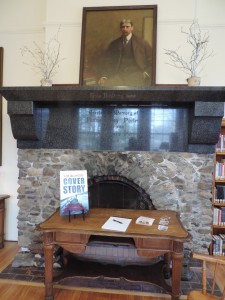
The fireplace still warms the reading room on winter days
The evening was a total pleasure. It took place in the handsome reading room where a comfortable wing chair had been arranged for me next to a gorgeous stone working (!) fireplace.
Old friends and new were there, enthusiastic and full of good questions.
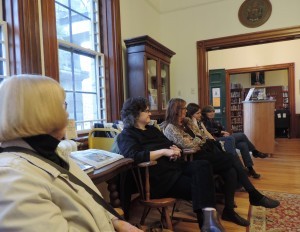
Some of the folks who came to Porter Memorial to hear me read from COVER STORY
I read a couple of passages, making a point to end with this line from the book: “You know what they say about Downeast Maine. The only thing more rugged than the coastline is the women.”
Laughter told me the audience appreciated the compliment.
Who neither wears granny glasses nor has hair that hangs to her waist.
I was worried about pretty much everything, to be honest. It was my first book.
Sarah, bless her, said this: COVER STORY gets Downeast Maine right, from its hard-headed, warm-hearted inhabitants to its remote, tragic beauty, and in it Brenda Buchanan spins a devious, deeply-felt tale as dark as a Maine winter. Add a smart, seasoned journalist-hero Joe Gale and Buchanan’s own intensely readable prose and you’ve got another you’re-gonna-love-it winning entry in an excellent series.
Brenda Buchanan’s Joe Gale Mystery Series features an old-school reporter with modern media savvy who covers the Maine crime beat. Cover Story may have been the first written, but it’s the second in the series. The first is Quick Pivot and the most recent is Truth Beat. All are available in digital format wherever fine ebooks are sold
Brenda can be found on the web at www.brendabuchananwrites.com on Twitter at @buchananbrenda and on Facebook at Facebook.com/BrendaBuchananAuthor.
May 22, 2016
Back to the Old Home Town: Why is this plot device used so often?
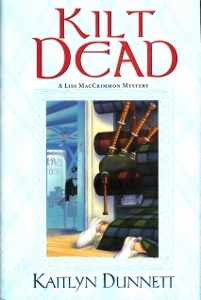 Kaitlyn Dunnett/Kathy Lynn Emerson here, today blogging about a topic that came up in the Q&A session after a panel I was part of not too long ago. The gist of the question was: why do so many cozy series (and not just cozies) begin with the sleuth returning to her old home town after X number of years away? Unspoken may have been another question: why do you writers keep using this tired old device?
Kaitlyn Dunnett/Kathy Lynn Emerson here, today blogging about a topic that came up in the Q&A session after a panel I was part of not too long ago. The gist of the question was: why do so many cozy series (and not just cozies) begin with the sleuth returning to her old home town after X number of years away? Unspoken may have been another question: why do you writers keep using this tired old device?
Well, yes, I have to admit that many of us have begun book one in a series with this particular set up, but there is a good reason for it. In fact, if you look at most mysteries—heck, look at most novels!—there are only three choices a writer has about the setting in relation to the protagonist. One is that the character is a long-time resident who already knows a great deal about the other characters. Miss Marple comes to mind. The second is that he or she is a newcomer to the area and therefore experiences people and places for the first time and brings an outsider’s perspective and a fresh point of view to the story (and to solving the crime). The third choice is to use a protagonist who has returned to a place she once knew well. To my mind, choice #3 has huge advantages over the other two because this situation combines the best parts of both of them. The sleuth has a certain degree of familiarity with people and places and is not dealing only with total strangers. At the same time, things have changed while she was elsewhere and she will need to rely on one or more of the characters who stayed behind to help put the pieces of the puzzle together.
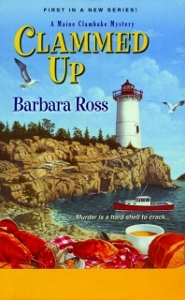 I would argue that this plot device can’t be overused simply because there are so many variations. The reason she comes back is probably the biggest one. In my Liss MacCrimmon series, it is because Liss has suffered a career-ending knee injury and needs a place to recover and decide what she’s going to do next. She was a professional Scottish dancer. In the first book in the series, Kilt Dead, she fills in for her aunt by running the family business, Moosetookalook Scottish Emporium. For Barb Ross’s sleuth, Julia Snowden, in the Maine Clambake Mysteries, it is a family financial crisis that brings her back to Busman’s Harbor, Maine, while in Lea Wait’s Mainely Needlepoint Mysteries, Angie Curtis returns to Maine in response to a phone call from her grandmother telling her that her mother, who disappeared many years before, has been found. That is also the murder Angie must solve.
I would argue that this plot device can’t be overused simply because there are so many variations. The reason she comes back is probably the biggest one. In my Liss MacCrimmon series, it is because Liss has suffered a career-ending knee injury and needs a place to recover and decide what she’s going to do next. She was a professional Scottish dancer. In the first book in the series, Kilt Dead, she fills in for her aunt by running the family business, Moosetookalook Scottish Emporium. For Barb Ross’s sleuth, Julia Snowden, in the Maine Clambake Mysteries, it is a family financial crisis that brings her back to Busman’s Harbor, Maine, while in Lea Wait’s Mainely Needlepoint Mysteries, Angie Curtis returns to Maine in response to a phone call from her grandmother telling her that her mother, who disappeared many years before, has been found. That is also the murder Angie must solve.
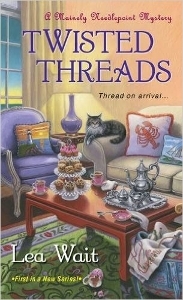 The death of a parent or grandparent and/or an inheritance to be dealt with is what brings many protagonists back home (or at least to a place where they spent part of their childhood). In Molly MacRae’s Haunted Yarn Shop Mysteries, Kath Rutledge receives a twofold inheritance from her grandmother—the yarn shop and the onset of hereditary psychic abilities. The first of Julianne Holmes’s Clock Shop Mysteries sends a grieving Ruth Clagan to deal with her grandfather’s business in a town where she spent many of her summers. The debut of Cheryl Hollon’s Webb’s Glass Shop Mysteries has Savannah Webb taking over the family stained glass business. On the surface, these set-ups sound similar, but they contain a great deal of variety, and not just in the type of store their protagonists inherit.
The death of a parent or grandparent and/or an inheritance to be dealt with is what brings many protagonists back home (or at least to a place where they spent part of their childhood). In Molly MacRae’s Haunted Yarn Shop Mysteries, Kath Rutledge receives a twofold inheritance from her grandmother—the yarn shop and the onset of hereditary psychic abilities. The first of Julianne Holmes’s Clock Shop Mysteries sends a grieving Ruth Clagan to deal with her grandfather’s business in a town where she spent many of her summers. The debut of Cheryl Hollon’s Webb’s Glass Shop Mysteries has Savannah Webb taking over the family stained glass business. On the surface, these set-ups sound similar, but they contain a great deal of variety, and not just in the type of store their protagonists inherit.
The character of the home town varies as widely as the emotional baggage the sleuth brings with her when she returns to a once familiar place. Coastal Maine and the Western Maine mountains are different worlds. Blue Plum, Tennessee is not Orchard, Massachusetts. Nor is it Athena, Mississippi, the setting for two series by the prolific Miranda (aka Dean) James. In the Cat in the Stacks Mysteries, Charlie Harris, a librarian, has returned to Athena after inheriting a house from his aunt.
When I started work on an idea for a new series, it never occurred to me that I was repeating myself by having the new sleuth return to her old home town. In fact, going back is kind of the point of the book. Mikki Lincoln is a woman my age (sixty-eight) who moved away right after high school. It’s an invitation to her fiftieth high school reunion that gets her thinking about her old stomping ground. A recent widow, she sells her home in Maine and heads for the rural New York state community where she grew up. In fifty years, there have definitely been changes. She’s in familiar territory . . . and yet she’s not. For an amateur sleuth, that seems to me to be the best of all possible worlds.
Kathy Lynn Emerson/Kaitlyn Dunnett is the author of over fifty books written under several names. She won the Agatha Award for best mystery nonfiction of 2008 for How to Write Killer Historical Mysteries and was an Agatha Award finalist in 2015 in the best mystery short story category for “The Blessing Witch.” Currently she writes the contemporary Liss MacCrimmon Mysteries (Kilt at the Highland Games ~ July 2016) as Kaitlyn and the historical Mistress Jaffrey Mysteries (Murder in the Merchant’s Hall) as Kathy. The latter series is a spin-off from her earlier “Face Down” series and is set in Elizabethan England. Her websites are www.KaitlynDunnett.com and www.KathyLynnEmerson.com
May 20, 2016
Weekend Update: May 21-22, 2016
 Next week at Maine Crime Writers there will be posts by Kaitlyn Dunnett/Kathy Lynn Emerson (Monday), Brenda Buchanan (Tuesday), Kate Flora (Wednesday), Vaughan Hardacker (Thursday), and Jen Blood (Friday).
Next week at Maine Crime Writers there will be posts by Kaitlyn Dunnett/Kathy Lynn Emerson (Monday), Brenda Buchanan (Tuesday), Kate Flora (Wednesday), Vaughan Hardacker (Thursday), and Jen Blood (Friday).
In the news department, here’s what’s happening with some of us who blog regularly at Maine Crime Writers:
Libraries who enter Sisters in Crime’s We Love Library lottery have to submit a photo of staff holding three books by SinC authors. The April winner was the New Gloucester Public Library here in Maine and they chose books by Kaitlyn Dunnett, Kathy Lynn Emerson, and Kate Flora. Congrats to the library, which will be receiving a check with which to buy books. And here’s the picture they submitted:
In other Maine news, bestselling mystery writer Nevada Barr has set her newest Anna Pigeon novel, Boar Island, in Acadia National Park. If you’d like to meet her, she will be making two appearances at Maine libraries. On Monday, May 23 at 6:30 PM she will be at Jesup Memorial Library in Bar Harbor and on Tuesday, May 24 at 6:30 PM she will be the guest of Gray Public Library in Gray, Maine. The Gray event will be held at the Spring Meadow Golf Club. Tickets are free, but must be acquired in advance. For more information, call 657-4110.
From Kaitlyn Dunnett: I’ve just added a special Scottie page to my Kaitlyn Dunnett website, for those who are interested in reading more about the two Scottish Terriers, Dandy and Dondi, who appear in The Scottie Barked at Midnight and will reappear, although only briefly, in Kilt at the Highland Games. You can find it at Kaitlyn’s Scottie Page Enjoy!
An invitation to readers of this blog: Do you have news relating to Maine, Crime, or Writing? We’d love to hear from you. Just comment below to share.
Keep those comments coming. Another bag of books and Maine goodies will go to one lucky person who reads and reacts to our blog posts.
And a reminder: If your library, school, or organization is looking for a speaker, we are often available to talk about the writing process, research, where we get our ideas, and other mysteries of the business. Contact Kate Flora: mailto: kateflora@gmail.com
May 18, 2016
Word of Inspiration – for Writers and Others
Twenty-five years ago I wasn’t a published writer living in Maine. I was a corporate manager living in New Jersey, vacationing in Maine, caring for four teenaged daughters, one granddaughter, my mother, and, at work, the up to 125 people reporting to me. The teenagers were troubled, my mother and granddaughter were disabled, and my corporate family was challenged by reorganizations, downsizing, and internal politics.
I wanted desperately to get out of corporate life, move to Maine, and write something other than corporate reports. I started journaling, writing short stories, studying the world of publishing, and trying to convince myself my future would be brighter.
One of the things I did was write down quotations I ran across in my reading; quotations that I felt either spoke to writing or to my life. I kept them in a bound blank book, which I carried everywhere for hope and encouragement.
A few days ago I picked up that book, still next to my dictionary and thesaurus on my desk, and browsed through it. In case any of the rest of you are also looking for words to think about, here are a few of the quotations I recorded.
“Clara says the truth is that I don’t want anything because there’s nothing I want that I believe I can have, when in fact all I have to do is reach out my hand. She really gets on my nerves sometimes.” — Marilyn French, Her Mother’s Daughter
“Nobody made a greater mistake than he who did nothing because he could only do a little.” — Edmund Burke
“There was, even at seventy, no escape. One did one’s work against a steady barrage of demands of people .. and the garden, too! It was all very well to insist that art was art and had no sex, but the fact was that the days of men were not in the same way fragmented, atomized by indefinite small tasks.” — May Sarton, Mrs. Stevens Hears the Mermaids
“If at first you don’t succeed, you are running about average.” – M.H. Anderson
“The most serious charge which can be brought against New England is not Puritanism, but February.” – Joseph Wood Krutch
“What lies behind us and what lies ahead of us is of little importance compared to what lies within us.” – Oliver Wendell Holmes
“My advice to the women of America is to raised more hell and fewer dahlias. – William Allen White
“It is more important to live the life one wishes to live, and to go down with it if necessary, quite contentedly, than to live more profitably but less happily.,” – Marjorie Kinnan Rawlings.
“We tend to be much kinder to other people – our friends, relatives, and offspring – than we are to ourselves.” – On Writers’ Block
“A writer is not so much someone who has something to say as he is someone who has found a process that will bring about new things he would not have thought of if he had not started to say them.” – William Stafford
“perhaps his life (Walt Whitman’s) had to be partial in order for his work to be whole.” – Justin Kaplan, Walt Whitman
“We judge ourselves by what we feel capable of doing, but others judge us by what we have already done.” – Henry Wadsworth Longfellow
Now, twenty-five years or so after I recorded those quotations, I’ve moved to Maine, my children have grown up and produced eight children of their own, my mother has died, I’ve married the man I ‘d loved for most of my adult life, but who was not in my life in those dark days twenty-five years ago, and I’ve had 17 books published, with two more scheduled for the fall of this year.
My life is what I’d hoped for, and worked toward. But sometimes there are still difficult days. And sometimes the right words can help me onward.
Perhaps today one of these quotations will speak to you.
Maine author Lea Wait writes the Mainely Needlepoint mystery series and the Shadows Antique Print mystery series and historical novels for ages 8 and up set in nineteenth century Maine. She invites readers to friend her on Facebook and Goodreads and check her website, http://www.leawait.com for more about her life and her books.
Mystery writers: truly a community, and the best kind
OK, Maine Crime Writers fans, the mystery of the missing blog post has been solved. Because here it is. Sorry it’s a little late today. OK, a lot late.
But you know what I DID do today? I signed up for the New England Crime Bake. For those of you who don’t know what that is, it’s held in Dedham, Massachusetts, every year on Veterans Day weekend. A conference for mystery writers and fans. And it’s awesome.
I’m probably repeating myself, because I know I’ve blogged about Crime Bake before, but everything about it bears repeating.
I went to my first one in 2008, desperate to find a way to get going on the mystery novel I’d planned on writing my entire life. I’ve gone every year since, and when I hit it this year, I’ll have two published mystery novels under my belt. I owe a lot of that to Crime Bake.
Not only was listening to the writers, publishers, editors — everyone at the conference — motivating, but it was also a huge learning experience for someone who knew next to nothing about getting a mystery novel published. Or, obviously, even getting one written.
Just as important, I made friends there that have been the foundation of my mystery writing career. At my first one, I met June Lemen and Lisa Haselton, two other New Hampshire writers, and we formed a writing group. That got me writing Cold Hard News, my first Bernie O’Dea mystery.
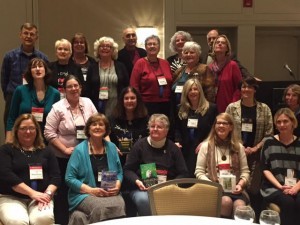
That’s me, second row second from left, in pink, with the other 2015 debut novelists at last year’s Crime Bake. Brenda Buchanan is two to my left, in the red sweater.
Over subsequent years I met fellow Maine Crime Writers blogger Brenda Buchanan, who, it turns out, was the reporter who always beat me when she was with the York County Coast Star and I was with the Biddeford Journal-Tribune in the early 1980s.
There are a lot of other people, too. Some of them I just see once a year (and on Facebook, of course), but it always feels like it was just yesterday.
I’ll tell you something about the newspaper business you may never guess otherwise: it’s not the most nurturing, supportive environment. It’s stressful, the stakes are high, our mistakes are out there for the world to see. People don’t send us flowers (OK, it happened to me once, but the guy was kind of a stalker), and rarely call or email to tell us they love us or what we do. They do call, but not to tell us that.
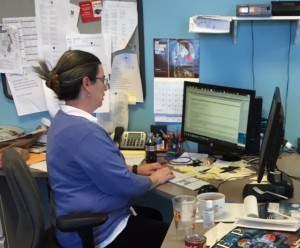
Doin’ journalism.
Even the hardest, most satisfying work is there for a flash, a day or two, then gone. I’m not bashing it. I’ve been doing daily journalism for thirty-three years and I love it. It’s a vocation to me, not just a career, and I can’t imagine doing anything else (or imagine anyone else who would have me).
The only other thing I could imagine doing is being a full-time mystery writer. And one of the things that would make that so awesome, aside from all the other obvious things, is the mystery writing community. I was welcomed when I was struggling to write a novel, I was welcomed as I was writing it, and I was welcomed after I was published. I’ve never, ever heard a harsh word from a fellow mystery writer, never felt like what I was doing wasn’t worthwhile or I wasn’t a member of the club. The encouragement and support is phenomenal.
Aside from the really good advice, support and encouragement from my former writing group and Brenda, and countless other friends in the mystery writing community, here’s stuff that wouldn’t have happened to me without Crime Bake:
When Cold Hard News was “finished,” but I still didn’t have a publisher, I signed up for a manuscript critique at the 2014 Crime Bake. I don’t get easily discouraged, but I’d been pitching and revising for four and a half years and if I weren’t a stubborn blockhead, may have given up. Hank Phillippi Ryan was my critiquer (I don’t want to say critic). She went through my first chapter with me in such a thorough and insightful way that Friday night that I spent the next afternoon rewriting it. When I told her Saturday night that I was inspired and reworking it, she encouraged me to email it to her when I was done. Right, I thought. She’s a nice person, but very busy and I doubt she has time for my cruddy manuscript. Sunday, after I got home from Crime Bake, I sent the reworked chapter to her anyway. She responded a couple hours later with an ecstatic email telling me what a great job I’d done, including an all-caps WOW and an admission that it made her teary-eyed.
Two months later, after I decided to skip trying the whole agent thing and directly query publishers who accepted submissions from authors, my now-publisher liked my manuscript. Maybe it would have happened anyway, but if they can’t get through the first chapter, they won’t read the rest. I have Hank to thank for that.
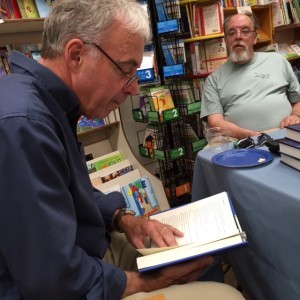
Gerry Boyle reads from Once Burned at a dual book signing in Waterville, Maine, last June.
After Cold Hard News came out, Ellen Richmond, a bookseller in Waterville, Maine, agreed to a signing with me and fellow Maine Crime Writer Gerry Boyle. Now you have to understand how Gerry is regarded in Maine. I work for the same newspaper he once did, and when people found out I was writing a mystery novel, they’d say “Like Gerry Boyle?” or “Have you heard of Gerry Boyle?” or “Now Gerry Boyle, there’s a mystery writer.” I don’t disagree. In fact, when I read his first book, Deadline, in the early 1990s, it was the first mystery I ever read that I felt got journalism right. He got Maine right, too. And I said, “See? I want to do what that guy does.” So yeah, I knew who Gerry Boyle was.
At a Crime Bake before Cold Hard News was published, I approached Gerry after he did a master class on writing character. I was kind of shy, thinking the big-shot writer would brush me off, but I wanted to introduce myself now that I was back in Maine and worked where he used to. Not only didn’t he brush me off, he was friendly and gracious enough that it led to a friendship.
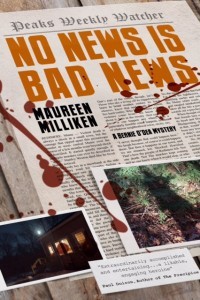
No News is Bad News, the second in the Bernie O’Dea mystery series, coming out in July. Thanks, Crime Bake!
That said, I was still nervous about a dual book signing last June. Here I was with my one book, shaky as hell that no one would like it, and Gerry was promoting Once Burned, his zillionth or gazillionth I think (the gazillionth-and-one just came out this week: Straw Man). Lots of people came to the signing, most of them to see Gerry. But here’s what Gerry did: he talked up my book. He didn’t have to, but he did. More than his own, or at least that’s how it felt. And people bought it.
Both of those experiences were huge lessons to me well worth the price of the Crime Bake admission. What they brought me in terms of “success” aren’t even the most important things about them.
Writing a mystery? Or even a non-mystery? Consider going to Crime Bake this year. You won’t regret it.
Maureen Milliken is the author of the Bernie O’Dea mystery series. Cold Hard News was published in June 2015, and No News is Bad News is due out in July. She is City Editor of the Morning Sentinel newspaper in Waterville, Maine. Follow her on Twitter @mmilliken47, on Facebook at Maureen Milliken mysteries and sign up for email updates on her website, maureenmilliken.com.
May 17, 2016
Into the Flow
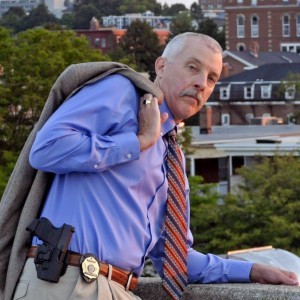 Last October I had the great pleasure of taking part in the first annual Murder by the Book, a two day event held at Bar Harbor’s historic Jesup Memorial Library. Is there anything more inspiring than autumn on the coast of Maine? As a rookie, among a dozen accomplished and award-winning Maine novelists, I was thrilled to have been included. On Friday evening, a handful of writers read aloud from unpublished works, gifting those in attendance a rare treat, a sneak peek at upcoming novels.
Last October I had the great pleasure of taking part in the first annual Murder by the Book, a two day event held at Bar Harbor’s historic Jesup Memorial Library. Is there anything more inspiring than autumn on the coast of Maine? As a rookie, among a dozen accomplished and award-winning Maine novelists, I was thrilled to have been included. On Friday evening, a handful of writers read aloud from unpublished works, gifting those in attendance a rare treat, a sneak peek at upcoming novels.
During one of the Saturday panels, Gerry Boyle and Julia Spencer-Fleming briefly discussed “the flow” that occasionally happens while writing. Being in the zone. Storytelling autopilot. Those times our stories take unexpected turns as they are being written. When characters begin to speak and act for themselves as the writer struggles to keep up. I used to believe this writerly flow was something that famous writers said to sound hip, that is, until it began happening to me. Any writer will tell you, those days are the absolute best, rare though they may be. If we could figure out a way to bottle that flow, manuscripts for entire novels would be completed in mere weeks. Unfortunately, it doesn’t work that way. It happens when it happens, often departing as quickly as it came. Writing a novel is hard work, believe me. Endless hours sitting in a chair, staring at a monitor, trying to untangle thoughts into something comprehensible and entertaining. But still, there are those glorious times when it almost seems to write itself.
As the author panel continued, I began to mentally wonder off, though no fault of Julia or Gerry, pondering this anomaly. I wondered, where does this flow come from? Is it a vehicle by which some magical muse inserts ideas into our heads? Sitting upon our shoulders and whispering suggestions. Or leading our fingers to the correct letters on the keyboard, rendering it into some kind of electronic Ouija board. And why doesn’t it happen to everyone? Why aren’t we all accomplished raconteurs? After all, everyone has a story to tell. Our entire lives are comprised of them. Those things that happen as we traverse the long and bumpy road of life. But if that’s all it takes, if we really are all bursting with stories ready to be told, where is release button to make them flow? Does the muse only appear to some folks and not others? Or could it be something else entirely?
I think it’s far more likely that we writers, who spend an inordinate amount of time inside our own heads, have simply exercised and developed the imagination muscle more than most. We’ve spent so much time poking holes in that thin membrane of the creative mind, the mental fabric restraining our best thoughts, that the stories just flow freely from our mind to the page.
Other writers may disagree. Each of us probably have our own thoughts on the source of this creative wellspring. But whatever the cause, I am sure of one thing. We’d all be eternally grateful if it happened more often.
May 16, 2016
Price Drop
Jessie: In New Hampshire, eagerly awaiting school to let out allowing her return to the coast of Maine.
As a thrifty New Englander I keep a weather eye on prices at the grocer. I have a bunch of kids and have spent a lot of years keeping them fed on a budget that would do my Mainer grandmothers proud. One easy and nutrious trick up my mitten has always been a reliance on recipes featuring eggs. No one looks at a spinach souffle and thinks you’ve offered them a cheap dinner. They are more inclined to ohh and ahh over the delightful smell and the cloud-like texture.
But in the last few months, those staples of my refrigerator have been much more expensive. Those of you who don’t do the shopping in your household may not be aware that the price of eggs has spent time in the scandalous range. At my local grocer a dozen of them reached the high price of $3.00. It was like a sign of the end times!
But this week, when I conducted the shopping, it was with a light heart I noticed a sale sign hanging over the egg display. In celebration of the price returning to 89 cents per dozen I thought I would share one of my favorite egg-based recipes. It is dairy free, gluten freen and delicious. It’s easy to make and perfect for warm weather. I use the leftover egg whites to make meringues.
Pineapple Nutmeg Flan
3 cups pineapple juice
1 cup brown sugar
1/2 teaspoon ground nutmeg
18 large egg yolks
In a saucepan bring pineapple juice adn 1/4 cup of brown sugar to a boil, stirring constantly, until the sugar dissolves. Lower heat to medium and simmer until reduced to about 2 cups. Stir occassionally. This will take about half and hour. Cool to room temperature.
Preheat the oven to 350F.
In a clean saucepan combine 3/4 brown sugar and 3 tablespoons of water. Stir over low heat until the sugar dissolves. Raise heat to high and cook, without stirring, until the sauce reaches a deep caramel color, approximately 10 minutes. You may swirl the pan gently if it looks like it is darkening more in one spot than another. Remove from heat immediately and pour sauce into the botoom of a large pie dish, tilting to cover the surface.
Set pie dish in a larger, oven proof pan like the bottom of a broiler pan.
In a large bowl beat egg yolks until smooth,. Add cooled pineapple juice mixture and nutmeg. Whisk together thoroughly. Pour into pie dish. Place pie dish/ larger pan ensemble on a rack in center of the oven. Add hot water to the larger pan until it reaches halfway up the outside of the pie dish. Bake for approximately 1- 1 1/2 hours or until center jiggles but doesn’t slosh as though still liquid. Cool completely.
Run a knife around the outside edge of the flan and invert onto a serving plate. Allow sauce to spill over the edges and decorate with freshly grated lime zest if desired.


![infographics_10076131-1115-allint-1 [Converted]](https://i.gr-assets.com/images/S/compressed.photo.goodreads.com/hostedimages/1464362408i/19231988.jpg)
